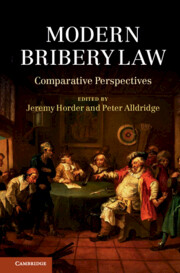Book contents
- Frontmatter
- Contents
- List of contributors
- Table of cases
- Table of statutes and international instruments
- Introduction
- Part I Bribery law: between public wrongdoing and private advantage-taking
- Part II Bribery without borders: tackling corruption in the EU and beyond
- Part III Ill-gotten gains: the challenge of prosecution, enforcement and asset recovery
- 8 Bribery and the changing pattern of criminal prosecution
- 9 Bribery and corruption: the UK framework for enforcement
- 10 Prosecuting bribery in Hong Kong's human rights environment
- 11 Is the UNCAC an effective deterrent to grand corruption?
- Bibliography
- Index
9 - Bribery and corruption: the UK framework for enforcement
from Part III - Ill-gotten gains: the challenge of prosecution, enforcement and asset recovery
Published online by Cambridge University Press: 05 May 2013
- Frontmatter
- Contents
- List of contributors
- Table of cases
- Table of statutes and international instruments
- Introduction
- Part I Bribery law: between public wrongdoing and private advantage-taking
- Part II Bribery without borders: tackling corruption in the EU and beyond
- Part III Ill-gotten gains: the challenge of prosecution, enforcement and asset recovery
- 8 Bribery and the changing pattern of criminal prosecution
- 9 Bribery and corruption: the UK framework for enforcement
- 10 Prosecuting bribery in Hong Kong's human rights environment
- 11 Is the UNCAC an effective deterrent to grand corruption?
- Bibliography
- Index
Summary
The UK framework for the enforcement of bribery and corruption laws has a bewildering tapestry of different agencies, investigators, prosecutors, intelligence gatherers, and government and non-government agencies and offices. In part, this has been caused by the difficulty in pinning down and defining bribery and corruption, but it also has a great deal to do with the multilayered approach to the investigation of crime and the different policy requirements involved. However, I will be concentrating on the main enforcers on the Bribery Act 2010 (‘the 2010 Act’) in England and Wales, and in particular on the Serious Fraud Office (SFO), in relation to overseas bribery. This is because there is a UK obligation to deal effectively with the bribery of foreign officials contained in the 1997 OECD Convention on Combating Bribery of Foreign Public Officials in International Business Transactions. The Convention helped to create an enforcement focus for overseas bribery of foreign public officials (albeit within a UK anti-corruption context), but the equivalent is lacking for domestic bribery.
Records of historical investigation and prosecution of bribery have proved hard to come by for a number of reasons, not least because there was no branded bribery offence until the advent of the 2010 Act. More confusion is caused through the general practice of subsuming bribery within general anti-corruption enforcement, which makes the gathering of branded bribery information difficult. A comprehensive approach to corruption (including enforcement) is now route-mapped in the United Nations Convention against Corruption (UNCAC). In 2010, the United Kingdom agreed to subject itself to a pilot review evaluation of compliance with UNCAC, which is on-going.
- Type
- Chapter
- Information
- Modern Bribery LawComparative Perspectives, pp. 251 - 266Publisher: Cambridge University PressPrint publication year: 2013



